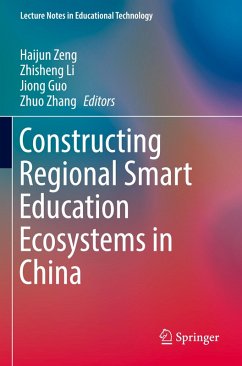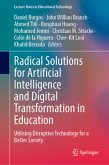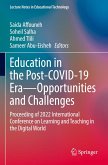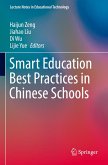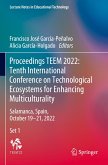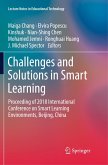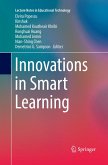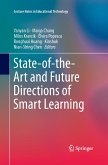Constructing Regional Smart Education Ecosystems in China
Herausgegeben:Zeng, Haijun; Li, Zhisheng; Guo, Jiong; Zhang, Zhuo
Constructing Regional Smart Education Ecosystems in China
Herausgegeben:Zeng, Haijun; Li, Zhisheng; Guo, Jiong; Zhang, Zhuo
- Broschiertes Buch
- Merkliste
- Auf die Merkliste
- Bewerten Bewerten
- Teilen
- Produkt teilen
- Produkterinnerung
- Produkterinnerung
This book enriches the understanding of regional smart education in China and promotes sharing of smart education case studies in China and abroad. It presents 46 case studies selected from a total of 644 case studies collected nationwide in China. These selected case studies focus on regional construction, research findings, and solutions. The case studies on regional construction mainly focus on the sustainable development mechanism of regional smart education. The research findings case studies showcase research results produced by research teams and individuals, which involve theories,…mehr
Andere Kunden interessierten sich auch für
![Radical Solutions for Artificial Intelligence and Digital Transformation in Education Radical Solutions for Artificial Intelligence and Digital Transformation in Education]() Radical Solutions for Artificial Intelligence and Digital Transformation in Education137,99 €
Radical Solutions for Artificial Intelligence and Digital Transformation in Education137,99 €![Education in the Post-COVID-19 Era-Opportunities and Challenges Education in the Post-COVID-19 Era-Opportunities and Challenges]() Education in the Post-COVID-19 Era-Opportunities and Challenges139,99 €
Education in the Post-COVID-19 Era-Opportunities and Challenges139,99 €![Smart Education Best Practices in Chinese Schools Smart Education Best Practices in Chinese Schools]() Smart Education Best Practices in Chinese Schools116,99 €
Smart Education Best Practices in Chinese Schools116,99 €![Proceedings TEEM 2022: Tenth International Conference on Technological Ecosystems for Enhancing Multiculturality Proceedings TEEM 2022: Tenth International Conference on Technological Ecosystems for Enhancing Multiculturality]() Proceedings TEEM 2022: Tenth International Conference on Technological Ecosystems for Enhancing Multiculturality129,99 €
Proceedings TEEM 2022: Tenth International Conference on Technological Ecosystems for Enhancing Multiculturality129,99 €![Challenges and Solutions in Smart Learning Challenges and Solutions in Smart Learning]() Challenges and Solutions in Smart Learning131,99 €
Challenges and Solutions in Smart Learning131,99 €![Innovations in Smart Learning Innovations in Smart Learning]() Innovations in Smart Learning116,99 €
Innovations in Smart Learning116,99 €![State-of-the-Art and Future Directions of Smart Learning State-of-the-Art and Future Directions of Smart Learning]() State-of-the-Art and Future Directions of Smart Learning116,99 €
State-of-the-Art and Future Directions of Smart Learning116,99 €-
-
-
This book enriches the understanding of regional smart education in China and promotes sharing of smart education case studies in China and abroad. It presents 46 case studies selected from a total of 644 case studies collected nationwide in China. These selected case studies focus on regional construction, research findings, and solutions. The case studies on regional construction mainly focus on the sustainable development mechanism of regional smart education. The research findings case studies showcase research results produced by research teams and individuals, which involve theories, models, technologies, practical investigations, or international comparisons related to smart education. Lastly, the solution case studies are technical solutions provided by enterprises for the development of smart education, which include application scenarios, methods, and effects in regions or schools around smart educational equipment, platforms, networks, tools, resources, or integrated solutions.
Produktdetails
- Produktdetails
- Lecture Notes in Educational Technology
- Verlag: Springer / Springer Nature Singapore / Springer, Berlin
- Artikelnr. des Verlages: 978-981-99-6227-3
- Seitenzahl: 244
- Erscheinungstermin: 19. November 2024
- Englisch
- Abmessung: 235mm x 155mm x 14mm
- Gewicht: 377g
- ISBN-13: 9789819962273
- ISBN-10: 9819962277
- Artikelnr.: 72181070
- Herstellerkennzeichnung Die Herstellerinformationen sind derzeit nicht verfügbar.
- Lecture Notes in Educational Technology
- Verlag: Springer / Springer Nature Singapore / Springer, Berlin
- Artikelnr. des Verlages: 978-981-99-6227-3
- Seitenzahl: 244
- Erscheinungstermin: 19. November 2024
- Englisch
- Abmessung: 235mm x 155mm x 14mm
- Gewicht: 377g
- ISBN-13: 9789819962273
- ISBN-10: 9819962277
- Artikelnr.: 72181070
- Herstellerkennzeichnung Die Herstellerinformationen sind derzeit nicht verfügbar.
Haijun Zeng, Ph.D., is Vice Dean of the Smart Learning Institute of Beijing Normal University, China, Deputy Director of the Educational Informatization Strategy Research Base (Beijing) of the Ministry of Education, and Deputy Director of the National Engineering Research Center of Cyberlearning and Intelligent Technology. His main research interests are online education and the Digital Learning Support (DLS) service system. Zhisheng Li, is a Ph.D. student at the School of Educational Technology, Faculty of Education, at Beijing Normal University, China. Her main research interests include smart education and digital education policy. Professor Jiong Guo, Ph.D., is Supervisor and Dean of the School of Educational Technology, Northwest Normal University, China. She is also Executive Deputy Editor of E-education Research and Executive Deputy Director of the Educational Informatization Strategy Research Base (Northwest) of the Ministry of Education, China. Her main research interests are information technology and education, and digital learning. Zhuo Zhang., is a project manager of National Engineering Research Centre of Cyberlearning and Intelligent Technology of Beijing Normal University. Her main research interests include smart education and the Application of artificial intelligence in education.
Preface.- Part 1 Overview.- Chapter 1 Constructing Regional Smart Education Ecosystem: Policy, Technology, and Practices.- Part 2 Regional Construction.- Chapter 2 Data Empowerment and System Remodeling Application.- Chapter 3 Group Intelligence Sharing Promotes Professional Development of Regional Teachers.- Chapter 4 Build a Smart Education Cloud Platform to Boost the Quality Development of Regional Education.- Chapter 5 Practice and Exploration of Digital Transformation of Integrated Education between Schools and Urban Areas.- Chapter 6 Smart Education Promotes the Revitalization of Rural Education.- Chapter 7 Smart Education Promotes the Practice of Urban-rural Integration.- Chapter 8 Focus on the Change of Learning Style and Promote the Practice of "New Three States" in Education.- Chapter 9 Create National Smart Education Demonstration Zone to Promote Digital Transformation.- Chapter 10 Drive the High-quality Development of Education with Data.- Chapter 11 Technology-Enabled Project-Based Learning: Let Every Child Embrace "Good Learning".- Chapter 12 "Six Actions" to Promote the Iterative Upgrade of Smart Education.- Chapter 13 Construction and Application Practice of "Smart School" Based on "Government-enterprise-school-research" Collaboration.- Chapter 14 Exploration and Practice of Regional Intelligent Operation Application.- Chapter 15 Promoting the Popularization of Artificial Intelligence Education.- Chapter 16 Strive to Build a Smart Education Public Service System with "Six Standards".- Chapter 17 Construction and Application Practice Exploration of "District-school Integration" Smart Education Cloud Platform.- Chapter 18 Selected Regional Excellent Cases of Smart Education Construction.- Part 3 Research Findings.- Chapter 19 Reflections on Integrating Interaction to Build a New Normal of Teaching in the Post-epidemic Era.- Chapter 20 Research on the Design of Systematic Model of Hybrid Learning and the Research on Effective Model.- Chapter 21 Research on Personalized Diagnosis and Feedback of Primary School Students' Physical Health Based on Big Data.- Chapter 22 Efficient Classroom in the Context of Data Intelligence and Educational Intelligence.- Chapter 23 Data-driven Large-scale Teaching Model Construction and Implementation.- Chapter 24 Research on the Application of Big Data in School Sports.- Chapter 25 Research on Big Data Helps the Physical Development of Rural Students.- Chapter 26 Holistic Governance of Education in Subliminaria from the Perspective of Artificial Intelligence.- Part 4 Solution Cases.- Chapter 27 Teaching Resource Construction and Application Solution Based on Knowledge Graph.- Chapter 28 Smart Education F5G All-Optical Network Solution.- Chapter 29 Smart Education Solution under the Background of "Double Reduction".- Chapter 30 Building a Digital Base for Education and Build a High-quality Education Support System.- Chapter 31 Building a Regional Efficient Operation Management Platform.- Chapter 32 Digital Resource Supply Solution: Create a Regional "New Learning Engine".- Chapter 33 Smart Experiment Classroom and Solutions in Popular Science Corner.- Chapter 34 Smart Teaching Assistants Empower Teachers to Do Well in Every Class.
Preface.- Part 1 Overview.- Chapter 1 Constructing Regional Smart Education Ecosystem: Policy, Technology, and Practices.- Part 2 Regional Construction.- Chapter 2 Data Empowerment and System Remodeling Application.- Chapter 3 Group Intelligence Sharing Promotes Professional Development of Regional Teachers.- Chapter 4 Build a Smart Education Cloud Platform to Boost the Quality Development of Regional Education.- Chapter 5 Practice and Exploration of Digital Transformation of Integrated Education between Schools and Urban Areas.- Chapter 6 Smart Education Promotes the Revitalization of Rural Education.- Chapter 7 Smart Education Promotes the Practice of Urban-rural Integration.- Chapter 8 Focus on the Change of Learning Style and Promote the Practice of "New Three States" in Education.- Chapter 9 Create National Smart Education Demonstration Zone to Promote Digital Transformation.- Chapter 10 Drive the High-quality Development of Education with Data.- Chapter 11 Technology-Enabled Project-Based Learning: Let Every Child Embrace "Good Learning".- Chapter 12 "Six Actions" to Promote the Iterative Upgrade of Smart Education.- Chapter 13 Construction and Application Practice of "Smart School" Based on "Government-enterprise-school-research" Collaboration.- Chapter 14 Exploration and Practice of Regional Intelligent Operation Application.- Chapter 15 Promoting the Popularization of Artificial Intelligence Education.- Chapter 16 Strive to Build a Smart Education Public Service System with "Six Standards".- Chapter 17 Construction and Application Practice Exploration of "District-school Integration" Smart Education Cloud Platform.- Chapter 18 Selected Regional Excellent Cases of Smart Education Construction.- Part 3 Research Findings.- Chapter 19 Reflections on Integrating Interaction to Build a New Normal of Teaching in the Post-epidemic Era.- Chapter 20 Research on the Design of Systematic Model of Hybrid Learning and the Research on Effective Model.- Chapter 21 Research on Personalized Diagnosis and Feedback of Primary School Students' Physical Health Based on Big Data.- Chapter 22 Efficient Classroom in the Context of Data Intelligence and Educational Intelligence.- Chapter 23 Data-driven Large-scale Teaching Model Construction and Implementation.- Chapter 24 Research on the Application of Big Data in School Sports.- Chapter 25 Research on Big Data Helps the Physical Development of Rural Students.- Chapter 26 Holistic Governance of Education in Subliminaria from the Perspective of Artificial Intelligence.- Part 4 Solution Cases.- Chapter 27 Teaching Resource Construction and Application Solution Based on Knowledge Graph.- Chapter 28 Smart Education F5G All-Optical Network Solution.- Chapter 29 Smart Education Solution under the Background of "Double Reduction".- Chapter 30 Building a Digital Base for Education and Build a High-quality Education Support System.- Chapter 31 Building a Regional Efficient Operation Management Platform.- Chapter 32 Digital Resource Supply Solution: Create a Regional "New Learning Engine".- Chapter 33 Smart Experiment Classroom and Solutions in Popular Science Corner.- Chapter 34 Smart Teaching Assistants Empower Teachers to Do Well in Every Class.

